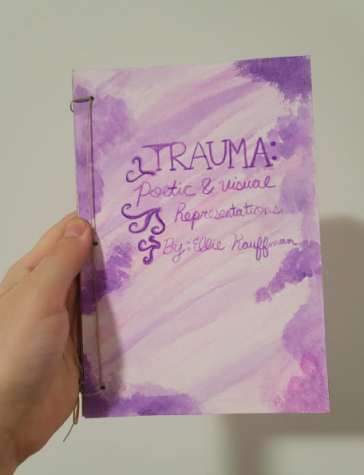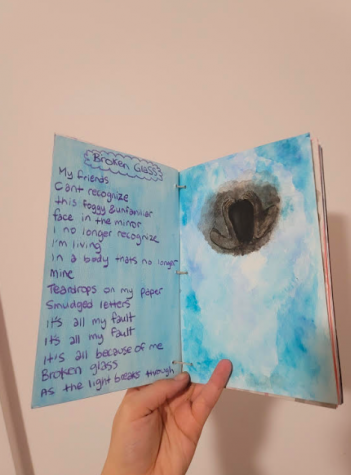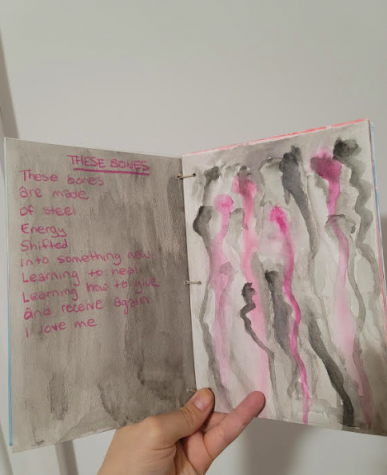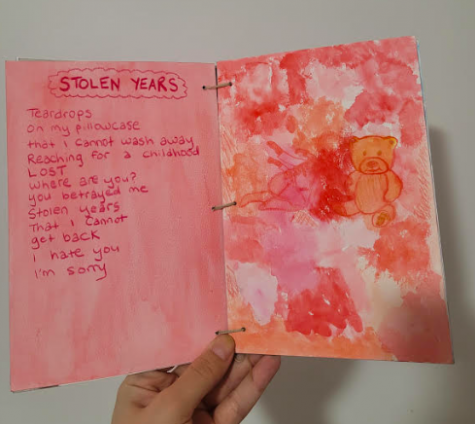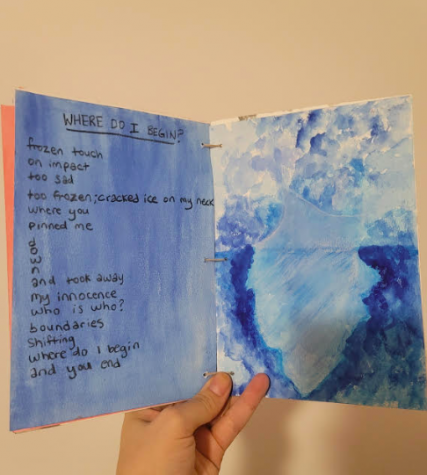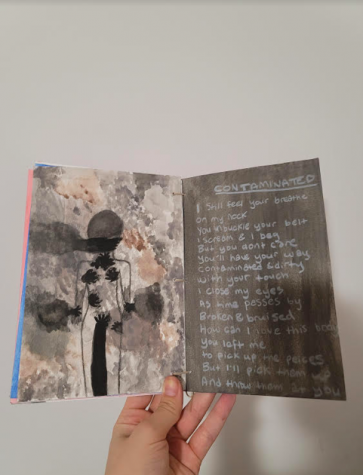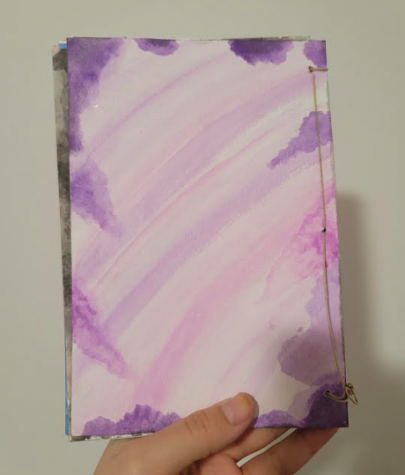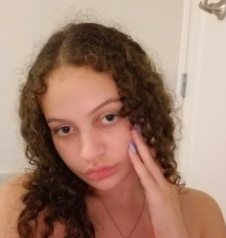Trauma: Poetic & visual representations
April 8, 2021
Project Description:
For my senior project I conducted interviews with 8 victims of trauma. I asked them questions about their experiences if they were comfortable sharing, as well as general questions about trauma, its impact, how they visualize it, and how they describe it. I used there responses to inspire poems and visual art peices that represent experiences of trauma.
Preface:
The following interviews with victims of trauma were used as influence for various poems and visual representations that I created to depict trauma. Some of my poems or art pieces combine influences from multiple interviews that I did to create an overall representation of trauma that I perceived from these interviews.
Interview Summaries:
Interview A:
This first interview was with a bipolar and schizophrenic teenage boy who had experienced trauma due to the explosive discovery of his disorders. Out of nowhere he began experiencing delusions, hallucinations and episodes of mania and depression. His mania involved delusions that he was god and that god was speaking through him, and that he could save the world. The isolation of covid made his episode really extreme. He told me about his hospitalization of three weeks and the trauma attached to the out of control feelings he felt. He talked about how therapy has helped him, but that trauma has impacted him by having memories replaying in his head. He said his memories of trauma feel dark and sudden and scary. In terms of visualization, he says trauma is dark colors like black or grey. He imagines scribbles and chaotic shapes and squiggly lines in these colors. In terms of words, he thinks of the words pain, brain, experience, emotional, and dark. He said metaphors are important when describing trauma. He said when better representing trauma you should know about the personal experiences people have gone through.
Interview B:
This next interview was with a teenage boy who was sexually assaulted. He said the biggest way trauma has impacted him was how he has viewed his future and life, wanting to move past the traumatic event. He wants to get away from his past more now. He also worries about people’s perceptions of him if they know what happened to him. He thinks it has also made him less vulnerable and less eager to be close to people, because it would require him to open up more. He describes the aftermath of trauma as paranoid that it is going to happen again, auditory hallucinations of the event (which he says was scarier than the assault itself) and the feeling of not being able to control the symptoms. Visually, he pictures trauma as blue. He thinks of a poem by Lucille Clifton called Breaklight, about light breaking. He imagines darkness coming into his life, and light going through a window. In terms of words, he thinks of the words scary, shitty, emotional, delirious, jumping out of a window, jumping through glass, intense, wild, unhinged. He says he will feel “anything” intense. He also thinks of jumping up and down. He said he felt “too self actualized to commit suicide” and he felt invisible in a sense like nothing could hurt him. He said memory repression is a big part of his trauma, and the fear that comes with it. He also added confusion of events and not remembering what really happened to him clearly.
Interview C:
This next interview was with a teenage girl who had trauma from being in the foster care system her whole life until she was 18, as well as being abused by one of the families she stayed with. She said the biggest way trauma has impacted her is the PTSD she now has from foster care. When she makes friends with women or girls, her relationship with her mom makes her hold resentment towards females because her mom wasn’t a good mom. She has abandonment issues and she feels like every female in her life is going to screw her over. With males, her father was in prison and never in her life, so she got used to boys getting their way and being rude and she told herself boys will be boys. She said in foster care her and her brother were in a physically and verbally abusive home which sent her into a depression where she self harmed at age 6 and wanted to kill herself at age 7. She remembers crying at her desk sobbing onto her homework and she was screamed at for not eating. She says the lasting impact feels like you are drowning but at the same time you have a super strength that nobody else has, and that anything else can be handled because of what you’ve already been through. She visualizes blue white and black colors, and someone caving into themselves with their hands to their face. She visualizes a small version of her, like the small child of her telling her it’s not her fault. In terms of words, she thinks of the words storm, unraveling and tangled. She imagines sad music and everything you see falls into the beat of the sad music. She says trauma is different for every person, and nobody should be told their trauma is less because someone has gone through more.
Interview D:
This next interview was with a teenage girl who had a negligent and abusive father and overall unhealthy family dynamic. She said trauma impacted her life a lot because her father was an alcoholic and absent. She doesn’t have a lot of memories with him. She feels guilty about reporting him for domestic violence against herself and her mother. She knows she shouldn’t, but she feels bad. He also mentally messed her up because she has OCD, anxiety and depression. She said the relationships between her mom and dad, her and her dad, and her and her mom were never really healthy. The impact is related to spoon theory. She can only handle so much energy for different tasks. She has more trouble now functioning regularly and everything tires her, and sometimes she doesn’t eat for a few days, or she has mood swings or cries randomly. She became really independent and strong from it too though because of her dad not being home. She took on the role of helping her mom and sister. She said her dad made her unconscious about her body, and was controlling of her appearance and when she spoke etc. She said she felt more like his property than his child. She has anxiety around doing things still that her dad never let her do. She has extreme stress chronically because he put her in that situation. He has a new wife and kids and she sees them in public and she feels heartbroken when she sees them. She says it feels like you are being hit or stabbed in the back. In terms of visualization, she visualizes red and black. She feels betrayal from his father moving onto a new family while she and her mother are stuck. She visualizes being stabbed in the back. In terms of words she thinks of pain, betrayal, not getting to start over, living in the past, sudden movements, twitching, panic attacks. (She twitches from sudden movements or loud sounds) He gave her an inflamed jaw from hitting her so hard. She still can’t chew for too long or open her mouth a certain way. She feels like she never got to have a childhood. She visualizes a child’s teddy bear. She feels like she was desperate for her dad’s approval and love. She feels like he was a mean kid at school who wanted to like her or think she was cool.
Interview E:
The next interview was with a teenage boy who was sexually abused as a child. He says he felt like had no control of his body, and that sexual abuse is always a power thing and not really about sex. He says his body stopped being his when it happened. He used the phrase “where do I begin and where do they end” to represent sexual abuse. He says it warps your relationship with yourself and everyone around you. He said he felt enmeshed with other people. He felt frozen emotionally like he couldn’t receive or give emotions from others. He said his dynamics with people were messed up in terms of boundaries with friends or family because of his abuse and being taken advantage of and that boundary being crossed. He said he began to look at himself and the world differently when it happened. He said he has to practice receiving love or compliments because of what he went through and taking down those old patterns. He said his judgement and behaviors definitely changed because of the abuse. He said he was a toxic person to himself and he coped with substances and self harm. His morals changed in that sense because he did those things, but now he’s healed and changed his morals to be more healthy for himself. He’s gotten really into self love since working on it. He said his judgement was warped and he was hyper aggressive, especially when people liked artists who were abusive, he would get extremely mad at them. He visualizes being frozen the second it hits you. In terms of words, he thinks of the words frozen, power, control, boundary, the phrase “Where I begin and you end”, and “mixed messages”. He says the second abuse happens to you, you become different from everyone else. He became friends with other people who were abused because they understood. In terms of his trauma he visualizes what happened but the memories don’t line up. He and his parents thought it was going to be a playdate and his expectations were confused when he was abused instead. He internalized it and blamed himself. He still gets triggered, but he feels he likes who he is now. He feels sexual abuse always needs to be validated in order to heal and know it was wrong and real.
Interview F:
The next interview was with a teenage girl who was brutally and violently raped at age 13. She wanted her interview to be completely confidential, so I will not go into details about her traumatic experience. However, she noted how her trauma has impacted her life immensely through severe PTSD, flashbacks, nightmares, panic attacks and anxiety around men. She mentioned how she now goes out of her way to avoid getting assaulted again, but staying home when it is dark out. When she thinks of trauma she thinks of the visual of handprints around where she was touched, as well as being pinned down, and having a hand covering her mouth. She remembers it being painful, as well as how almost being killed changed her perspective on life to make her appreciate things more. She says to this day she has a high startle response, and that even if she is tapped on the soldier she may scream.
Interview G:
The next interview was with another teenage girl who was sexually assaulted. She says her trauma changed her life completely. She said she lost many friends because nobody believed her. She said the situation allowed her to get to know herself better, and she learned coping skills. She learned a lot about self care. The immediate effects of the assault included dissociating for weeks. She also suffered from imposter syndrome because she had self doubt and confusion about what happened. She said her trauma impact felt like a lot of flashes and “going in and out of whatever states of normalcy you can find.” She said she pictures her trauma as an aura, because you can tell someone’s energy when they are traumatized is different. She imagines her aura to be a dark purple or maroon color. Visualizes those hues around her. She also felt immense isolation, shock, loneliness, grief and fear as words she associates with trauma. She also feels there is something instinctual about it because your body knows something is wrong and your mind needs to catch up with your body. She says she vividly remembers that night and she imagines insomnia and flashbacks when she thinks of representing her trauma. She also notes that trauma is not the same for everyone.
Interview H:
The next interview was with a teenage girl who was mentally abused, had an addict as a parent, had another parent threaten to kill themselves in front of her, and a loss of a family member. She says she deals with day to day triggers everywhere, which is the biggest part of her trauma. She says it’s hard to do a lot of little things because of constant reminders she gets. She says there is a constant pressure and voice inside her head. With extensive trauma that has gone on for years, she says it’s hard to pull yourself into the present. She visualizes her trauma as dark colors, graphic violence, a never ending fall, and a cave where you can hear noises but can’t see them. She says she would describe trauma as a journey, and something to fight through. She says it doesn’t define her but it’s a big part of her. She images hands that are always grabbing her, but she tries to pull back. She adds that people with trauma are not faking anything, and people don’t share their trauma everywhere and the media makes it look like all traumatized people are going to grow up to be exactly like what happened to them.
Preface:
The following photos depict images or language that may be disturbing to others. They depict abstract and direct representations of trauma through written and visual content. They are based on the above interviews with real victims of trauma. Each poem or visual may be influenced by multiple interviews from above.
